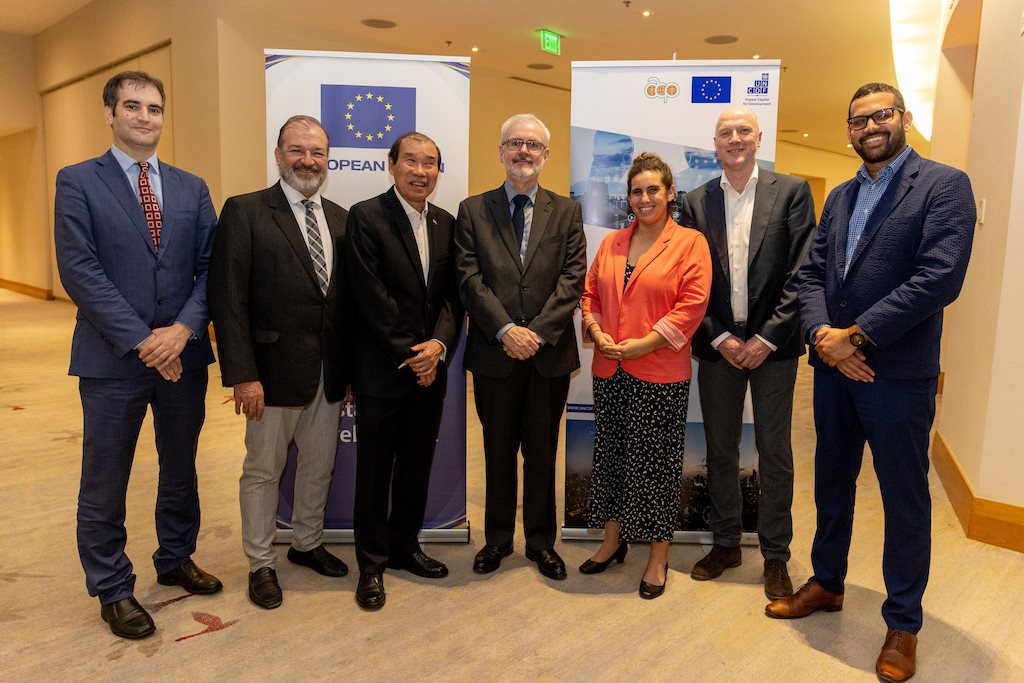
UNCDF
- |
Advancing Digital Payments and Financial Inclusion Across the Eastern Caribbean: Successful Concluding of UNCDF-EU-OACPS Technical Workshop Series
Thursday, January 19th, marked the closing of the first United Nations Capital Development Fund (UNCDF), European Union (EU) and Organisation of African, Caribbean and Pacific States (OACPS) “Advancing Digital Payments & Financial Inclusion Across the Eastern Caribbean” Technical Workshop Series. The three-day technical workshop brought to the region through the UNCDF-EU-OACPS Global Partnership on Digital Finance for Resilience, took place in Port of Spain, Trinidad and Tobago. The Workshop was supported by the United Nations Development Programme (UNDP) whose Trinidad and Tobago Multi-Country Office hosts the UNCDF Eastern Caribbean Regional office and helps facilitate on-the-ground operations across the region.
The partners recognize the commitment of the Government of Trinidad and Tobago in advancing its digital finance agenda and were thrilled to have had the opportunity to launch the Workshop Series in Trinidad and Tobago. As such the technical workshop was opened with a keynote address by the Minister of Finance from the Government of the Republic of Trinidad and Tobago, the Honourable Mr. Colm Imbert.
The Keynote Address provided global perspectives on financial inclusion as well as insights on Trinidad and Tobago’s approach to developing a cashless society, including the country’s establishment of new entities to lead the cashless agenda and strong political will to develop an enabling environment for digital finance.
“Financial Inclusion is an integral part of the global development agenda, and is recognised as an enabler of many things, such as economic growth and economic health to agricultural development, educational advancement, development of robust and sustainable businesses, increased savings, consumption, investment opportunities, and specially designed financial instruments and solutions to support and empower vulnerable groups,” Minister Colm Imbert said in his Keynote Address.
Furthermore, Minister Colm Imbert noted that financial inclusion is at the heart of financial sector transformation and economic recovery.
The workshop was attended by the Government of the Republic of Trinidad and Tobago’s Minister of Digital Transformation, Senator Honourable Hassel Bacchus as well as the Minister of National Security, the Honourable Fitzgerald Hinds. Regulators and related stakeholders from Trinidad and Tobago as well as the Eastern Caribbean states were also in attendance, which underscored the commitment of the Eastern Caribbean to digitally transform their financial sector and build a digital economy.
The Regional Workshop Series was launched in response to regional requests, and this first workshop focused on:
- regulating, licensing and supervising E-money and fintech; and
- cybersecurity for mobile and digital payment services.
The event, which was attended by over 80 in-person participants and over 150 people virtually, provided participants with lessons learned from leading experts from across the world and mapped possible solutions to responsibly enable digital finance for regulators in the region, focusing on harmonization and collaboration.
Ambassador of the European Union, Peter Cavendish, commented:
“More than ever, digital technologies have a central role to increase access to and usage of affordable financial products and services that meet people and business needs as well as accelerate economic recovery from the coronavirus pandemic. Cooperation on digital technologies is therefore very important and the reason that it is one of the EU’s new pillars of support with partner countries. I am happy that I was able to join the Workshop’s very informative presentation and extremely satisfied with the successful outcome of the three-day workshop. The takeaway for all participants is that ‘no one should be left behind in the digital age’.”

Escipión Oliveira Gomez, Assistant Secretary General for the Secretariat of the Organisation of African, Caribbean and Pacific States noted:
“OACPS was created, among others, to promote the integration of African, Caribbean and Pacific countries into the global market with a view to contribute to the eradication of poverty. That is exactly why peer exchanges like this are so important. They ensure that we learn from each other and find the best solutions for the islands of the Eastern Caribbean.”
UNCDF Programme Manager Bram Peters explained:
“In the fast-changing digital economies, where the playing field constantly evolves, policies and regulations need to guide the growth of a robust and inclusive digital economy, while at the same time protecting its users. It has been very encouraging to see how representatives of regulatory bodies from across the region have contributed to the discussions these last three days as they have a key role to play in designing effective frameworks. At UNCDF, through the Digital Finance for Resilience Programme, we are committed to leaving no one behind in the digital economy and look forward to continuing collaboration with Trinidad and Tobago and the Eastern Caribbean Islands States to ensure this.”
UNDP Resident Representative Gerardo Noto stated:
“This is a pivotal time for Trinidad and Tobago and the Eastern Caribbean, and policymakers have demonstrated strong commitment towards crafting solutions and approaches to responsibly enabling digital finance. At the UNDP, we believe digital finance and financial inclusion is a key enabler that contributes towards the Sustainable Development Goals and is a pre-requisite to building a strong digital economy. We are thrilled to have the opportunity to host the UNCDF Eastern Caribbean office and jointly expand our remit to support Governments across the Eastern Caribbean to reach their digital finance and financial inclusion goals”.
Previously posted at :
RELATED NEWS


